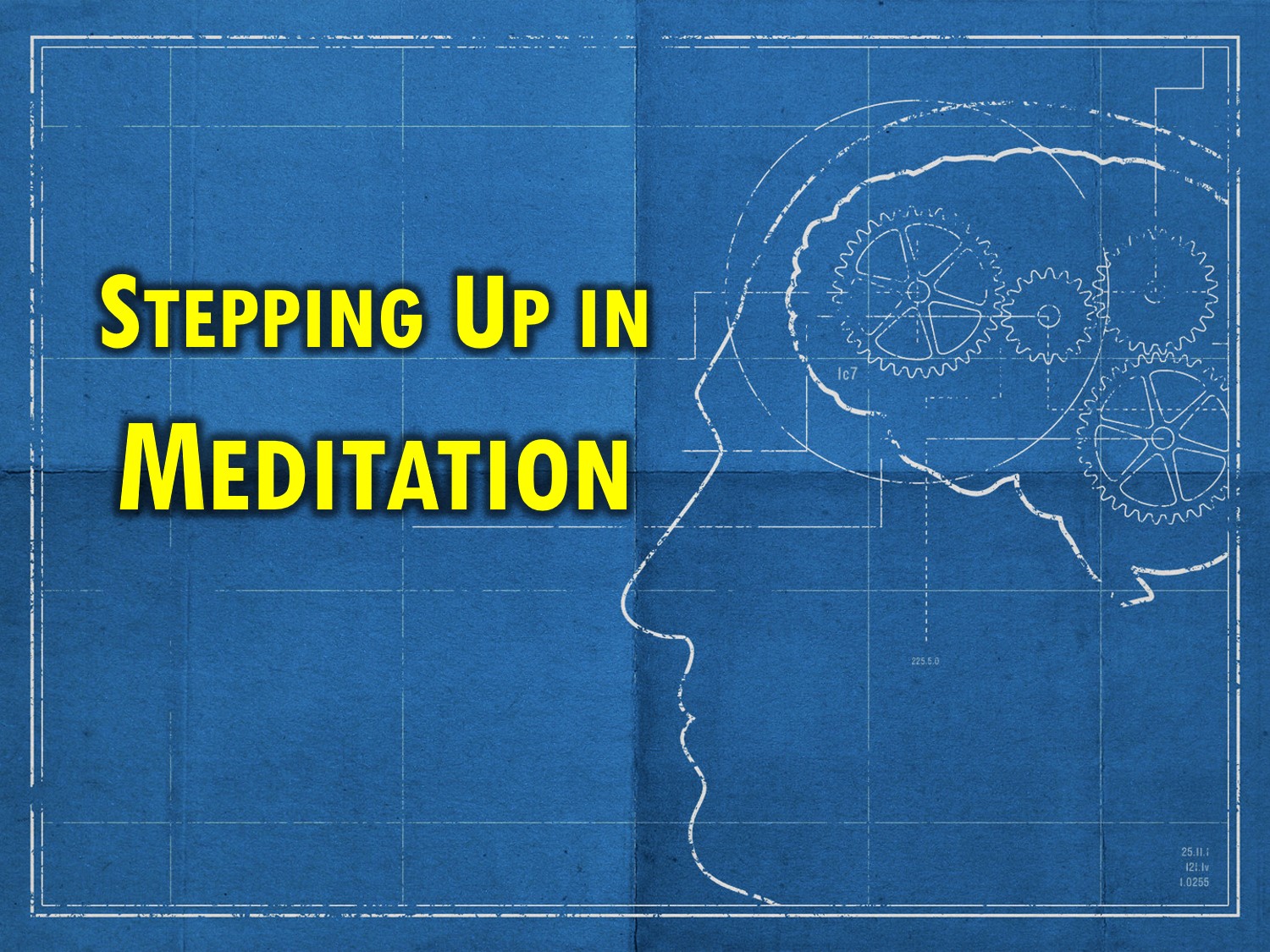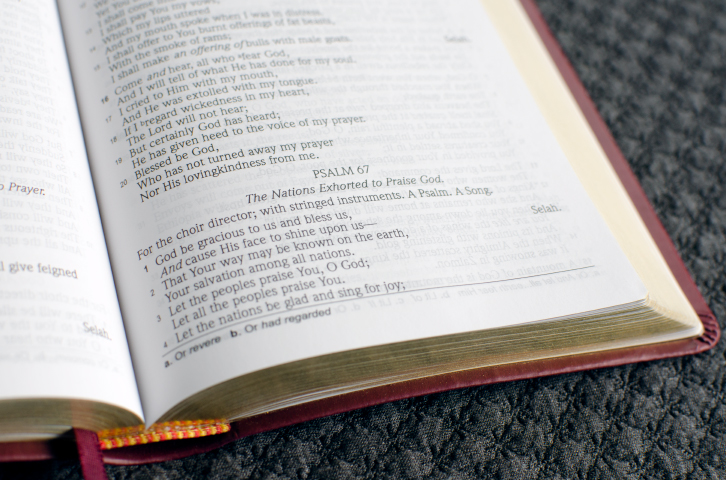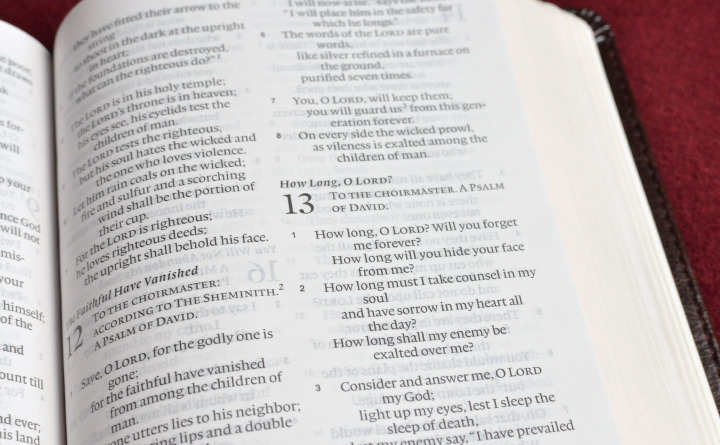Blog
Stepping Up in Meditation
Tuesday, February 12, 2019

In our first “Stepping Up” series of the year, Shawn and I have addressed four topics that are familiar to every Christian: prayer, Bible reading, worship, and obedience. I think all of us would agree that these are basic, foundational practices essential to our spiritual lives.
In the fifth and final sermon in this series, I’ll be examining a topic that I believe is no less important, but that is much less familiar. It is the subject of meditation. Biblical support for meditation is widespread. The word itself is used in 23 different places in the ESV, and the concept is commonplace throughout the Bible. It’s fair to say that meditation is no less important to our spiritual welfare than prayer, reading, worship, and obedience.
Nonetheless, I think brethren often don’t recognize how important it ought to be to them. Many of us don’t associate meditation with Christianity at all, and that’s something we need to work on. This morning, then, let’s consider how we can step up in meditation.
First, let’s ask WHAT MEDITATION IS. If I asked most of you, you’d probably come up with a mental image of some Buddhist monk sitting there cross-legged with his eyes closed, making the sacred sign with his hands. However, that’s not what Biblical meditation is about. Instead, consider what Paul writes in Philippians 4:8. Other translations here will say, “think on”, “dwell on”, or even “meditate on”.
In short, Bible meditation is when we take some wholesome, spiritual thought, and we spend some indefinite amount of time turning it over and over in our minds. Along with studying the word and reading the word, meditating on the word is supposed to be one of the main ways that we interact with it.
Nor does this even necessarily have to be about the Bible directly. You ever find yourself singing a hymn over and over to yourself, thinking about the words as you’re singing them? That’s meditation too. The same is true when we’re thinking about people we know who have revealed the word in their lives and considering the godliness of their actions.
This isn’t a high-intensity activity. Instead, it’s the opposite. Ideally, “thinking about these things” is what we find our minds doing whenever we aren’t using them for something else. We’re at the sink washing dishes, and lo and behold, we start meditating on the things of God! It’s not some fancy spiritual discipline. Meditation is as everyday as getting out of bed in the morning.
However, for all its everydayness, meditation is something we can’t do without. Let’s consider, then, WHY MEDITATION MATTERS. Look at Joshua 1:8. The logic here is very simple. If you talk about God’s word, meditate on God’s word, and obey God’s word, God will bless you. If you omit any of those steps, you won’t get the result.
Let’s put it this way. You ever known somebody who went to church faithfully, but was just as mean and hateful as they could be? People like that probably have a meditation problem. They hear the word, but they don’t take that word home and think it over. It just goes in one ear and out the other. As a result, when it comes time for them to make a moral decision, they don’t have the word in their hearts to guide them into godliness. The word has not changed them because they did not give it the opportunity to change them.
We have to do the opposite. We have to meditate on the word we have been taught so that it will change our hearts and our lives. Otherwise, it’s like trying to get bread to rise by dumping a bunch of yeast on top of the bread dough and letting it sit there. What happens if you do that, ladies? You get a floury, watery mess that doesn’t rise, that’s what! If we don’t knead the yeast into the dough, it can’t do its work. Meditation is kneading God’s word into our hearts. Unless we do that, we rob it of its power to transform us.
I want to spend the remainder of the sermon talking about HOW TO MEDITATE. First, we have to PUT TO DEATH THE EARTHLY. Let’s read here from Colossians 3:5-8. Notice that Paul isn’t merely warning us here about ungodly actions or ungodly speech. He’s warning us against ungodly thoughts. The problem is that it’s possible for us to meditate on evil things too, and when we’re working those into our hearts, they will surely corrupt us.
Let me give you an example. Like any of us, I face temptation, and one of the temptations I most struggle with is holding a grudge. My fleshly self wants to carry a grudge until it dies of old age, then have it stuffed and mounted!
That’s a problem not just because we’re supposed to be tenderhearted and forgiving, but because of what that grudge-holding will do to me or any of us. When I’m going around meditating on that grudge, first of all, it’s keeping me from thinking about whatever is true, honorable, just, and so on. All that good stuff has been blocked out.
Instead, I’m dwelling on evil things—the wrong that I think has been done me and the anger that I feel about it. I’m hardening my heart against other people, and I’m becoming more and more convinced of my own self-righteousness. Brethren, that kind of meditation is spiritual poison! None of us can afford to dwell on things like that!
Instead, we must STORE UP THE WORD IN OUR HEARTS. Look at the words of the psalmist in Psalm 119:11. We’ve said that meditation is thinking about godly things. Well, if we want those things in our heads to think about, we have to put them there in the first place, and we have to love them enough to dwell on them.
Meditation isn’t a self-starting activity. You don’t just say to yourself, “I’m going meditate on the things of God for the next 15 minutes!” I don’t know. Maybe that would work for you, but it would feel very unnatural and weird to me. Instead, I’ve found that the key is packing my brain so full of spiritual things that I can’t help but think about them.
That starts with our Bible reading. You know, it’s amazing that every one of us has in our possession at least one complete copy of the word of God. Our first-century brethren would have turned green with envy! What a priceless opportunity every one of us has, every day, to put that word in our hearts so we can meditate on it!
The same is true with other sources of spiritual wisdom. I know people who keep hymnals on their bedside tables and read a hymn or two every night before turning in. Among our hymns are some of the most beautiful things ever written in the English language. They’re perfect for meditation! If that’s not enough, we need to spend more time with strong Christians whose words and conduct will give us good things to dwell on. The more time we spend with these things, the more we will learn to love them, and the more we will meditate on them.
Chapter Summaries, Job 1-5
Monday, February 11, 2019

Job 1 sketches out both the prosperity and the downfall of the title character. The first eight verses paint him as a man who has everything in both a physical and spiritual sense. He is as righteous as he is wealthy. However, his prosperity and righteousness attract the attention of Satan, who claims that the second is the result of the first. Satan seeks and receives permission from God to take away all of his blessings without harming his health. Satan does precisely this, using various means to destroy not only Job’s flocks and herds, but also his children.
Job 2 is more of the same. God and Satan have another conversation. God points out that Job, despite having lost his prosperity, has not ceased to be righteous. Satan promises different results if he is allowed to up the ante, attacking Job’s health as well. God gives Satan permission, and now Job has a plague of boils to go along with his other problems.
Job’s calamities begin to draw notice from others. His wife tells him to curse God and die. Job righteously refuses. Then, three of Job’s friends, named Eliphaz, Bildad, and Zophar, show up. They sit in mourning with him for a week, saying nothing.
Job 3 contains the first of Job’s poetic speeches. He begins it by calling a curse down on the day of his birth and the night of his conception. In Job’s view, both the day and the night have betrayed him because they allowed him to exist. He would have been far better off if he had never been born. He considers the dead with longing because they no longer have to suffer.
Instead, he wants to know why he continues to exist. For him, there is no joy in life, only suffering. The key question appears in v. 23, in which Job asks why life continues to be granted to him when God clearly is set against him.
Job 4 is the beginning of Eliphaz’s first speech. Eliphaz accuses Job of being ready to dish out spiritual correction but not so ready to take it. He then maintains that the innocent are never oppressed by God. Instead, God only makes the wicked suffer. Eliphaz then relates a vision that he saw. In this vision, a fearsome specter points out that it is impossible for man to be right in the sight of God. Even angels transgress, and we’re nothing next to them! People perish because of their sins.
Job 5 continues Eliphaz’s narrative. He points out that in his experience, it is the wicked and foolish who suffer. They bring it on themselves. He encourages Job to turn to God, who rescues the poor and needy while bringing down the proud. He thinks that Job needs to accept God’s rebuke, implying, though not saying, that he thinks that Job’s problems are sin problems. Once Job is willing to do that, all of his difficulties will clear up. Repent, Job. It’s for your own good.
Compassion in Jonah
Friday, February 08, 2019
.jpg)
A few weeks ago, after I finished going through Jonah in my daily Bible reading, I posted on Facebook, “I love the book of Jonah! It is both warm and subtle.” In what is perhaps a sign that I deadpan too much on Facebook, most who responded thought I was joking. Those who took me seriously, seriously disagreed.
Apparently, an explanation is in order!
I think part of the problem is that when most Christians think of Jonah, they think of the eponymic prophet and his encounter with the not-whale. The story is dramatic, but it is admittedly not very cozy. However, the book is not about Jonah’s ingestion by a great fish, nor even about his preaching mission to Nineveh. As impressive as those things are, they’re not the point. Instead, the theme of the book is God’s efforts to teach His wayward prophet compassion.
Think about it. In the opening scene of the book, God tells Jonah to go to Nineveh, and Jonah heads in the opposite direction, presumably because he isn’t terribly interested in saving the Ninevites. At this point, God would have been fully justified in turning Jonah into a grease spot. However, he doesn’t. Instead, He sends Jonah on his undersea journey to give him time to repent, just as He wants to give Nineveh time to repent.
Jonah does, and once he’s back on dry land, he grudgingly goes to Nineveh. Then, he warns the people of God’s impending judgment, even though he really wants to see them destroyed. However, the outcome is exactly what God wants to see, and exactly what Jonah doesn’t want to see. The city repents en masse, and disaster is averted.
Jonah, however, remains as hard-hearted as ever. He camps out on the hills above the city, hoping that God will change His mind and destroy it (the opposite of Abraham’s perspective on Sodom, if you think about it). In one last attempt to correct His wayward prophet, God raises up a plant to shade him and then kills it. When Jonah gets upset, God points out that if Jonah is right to get emotionally attached to a plant, God is right to feel compassion for a city filled with human beings.
This is a story that gives me a great deal of hope. It clearly reveals the depth of God’s compassion, not only for Nineveh, but for one of His own who repeatedly refuses to get it. I’m glad I serve a God like that, not least because of all the times when I have repeatedly refused, and probably still do repeatedly refuse, to get it. I am a daily witness to the greatness of His mercy.
Second, the story of Jonah illustrates God’s patience. Despite multiple provocations, God doesn’t give up on Jonah. Instead, He continues teaching him, right up to the last sentence of the book. As a disciple of Jesus, I know that I am very much a work in progress, and I am thankful that God will patiently continue His work in me and not give up on me.
Is a book filled with storms and judgments stereotypically warm? Well, no, but every time I read it, I find myself warmed anyway. The conflict in it isn’t God’s fault, but Jonah’s. The compassion, though, all belongs to God.
We Should Sing More Psalms
Thursday, February 07, 2019

Recently, I spent a weekend down in Texas working on a project called Timeless. It is a modern-day psalter—an adaptation of all 150 psalms into lyrical and musical forms suitable for use in a-cappella congregational worship. Though I was happy to help, Timeless certainly isn’t my brainchild. Indeed, it had been pursuing this goal for a dozen years before I ever encountered it.
However, the more I think about it, the better I like the idea of singing more psalms. Anybody who pays attention to my writing on worship knows that there are two main lyrical issues that concern me: better Biblical content and greater emotional range. Singing more of Psalms, and especially singing paraphrases that are representative of the content of Psalms, addresses both of those concerns.
Now, it’s true that we have some psalm content in our repertoire already. Nearly every Christian knows the likes of “Hallelujah! Praise Jehovah!” and “The Lord’s My Shepherd”. However, those upbeat hymns of praise and assurance give us a distorted picture of what the Psalms are like. Most of the 150 are not upbeat and happy. To the contrary, most psalms are laments, filled with sorrow and the struggle to find God in difficult times.
Even our song texts that come from psalms of lamentation often manage to miss the point. Take, for instance, the praise song “Shield About Me”. We sing it frequently at Jackson Heights, and I like it, though the high-flying tenor line is kind of a strain for my baritone voice. The lyrics are quoted from Psalm 3:3.
That’s fine, as far as it goes. I’m all about praising God as my shield, my glory, and the lifter of my head. However, Psalm 3:3 isn’t its own proverb. It’s in the context of Psalm 3:1-2, which reads, “O Lord, how many are my foes! Many are rising against me; many are saying of my soul, ‘There is no salvation for him in God.’”
We would never glean it from “Shield About Me”, but Psalm 3 is another one of those psalms of lamentation. The ascription tells us that David wrote it when he was on the run from Absalom. These are the words of a man whose own son is trying to kill him! The idea of God as our shield and glory and head-lifter is powerful on its own, but when it is contrasted with human faithlessness and evil, it becomes sublime. Even if our loved ones betray us, God is still on our side!
We need to be singing things like that, though they undeniably make many Christians uncomfortable. You know what, though? That unpleasant emotion that makes you uncomfortable may be exactly the emotion that a brother or sister in Christ is feeling and desperately, desperately needs to sing about. Don’t think a psalm about betrayal by a family member could be relevant? Talk to a Christian whose spouse has cheated on them.
We live in a culture that insists on authenticity, but too often our song worship is inauthentic. We sing as though every problem a Christian has can be solved with a pasted-on smile and a snappy two-pager. Is it any wonder that so many Christians seem emotionally detached from our singing? Maybe, just maybe, it would help if we invited them to sing what they were truly feeling. Maybe it would help if we invited them to sing from the Psalms.
Psalm Summaries, Psalms 11-15
Wednesday, February 06, 2019

Psalm 11 is David’s appeal to God in a time when he fears that God has abandoned him. He feels that even if he flees like a bird to the mountain of God (which is where the hymn “Flee as a Bird” comes from), the wicked will shoot him down. He is helpless and powerless.
However, despite his powerlessness, he still trusts in the ultimate justice of God. He appeals to God to punish his wicked enemies according to their wickedness. He concludes by expressing the contrasting hope that the Lord will reward the righteous in His presence.
Psalm 12 sets out the spiritual struggle of David with people who are lying about him. In vs.1-2, he sets out the problem: flattering and double-tongued people who trust in the power of their lies. Vs. 3-4 appeal to God to judge those who sin with the tongue. In vs. 5-6, David predicts God’s rescue of the poor and needy from the liars who oppress them. He also contrasts the lies of the wicked with the pure speech of God. The psalm concludes in vs. 7-8 with an expression of hope in the protection of God and a condemnation of the wicked whose continuing presence makes God’s help necessary.
Psalm 13 is another psalm of lamentation from David in a time when God seems absent and his enemies are all too present. He wonders is God is going to forget and abandon him forever, giving glory to David’s enemies by default. David predicts that if things keep going in the same direction, his enemies will kill him and boast in his death. However, in the conclusion of the psalm, he remembers the graciousness of God’s past dealings and expresses the confidence that God will give him reason to rejoice this time too.
Psalm 14, also by David, presents a pessimistic perspective on the foolishness and wickedness of humankind. People everywhere doubt God’s existence and give themselves over to sin. God looks down from heaven, searching for one righteous man, but He can’t find even one. It’s enough to make one wonder if David was writing this in 2019!
However, David points out a problem with the wicked. In their oppression of the poor, they aren’t reckoning with God, who protects the poor. Sooner or later, God is going to make things right. The final verse of the psalm expresses the hope that He will do so soon.
Psalm 15 presents David’s take on a much more optimistic subject: what it takes to dwell in the presence of God. He tells us that God favors those who a) live righteous lives, b) are honest with themselves, c) don’t betray others, d) love the righteous and despise the wicked, e) keep their word under all circumstances, and f) don’t oppress the poor. Do these things, and God will sustain you.


